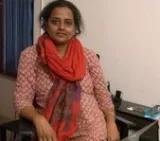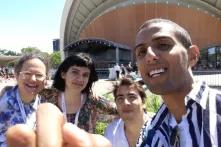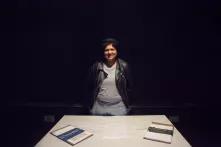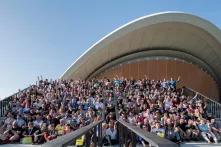There was an atmosphere of fear, yet at the same time the need to confront and fight for basic human rights became urgent. There was also a need to document everything that happened and that is what this story is all about.
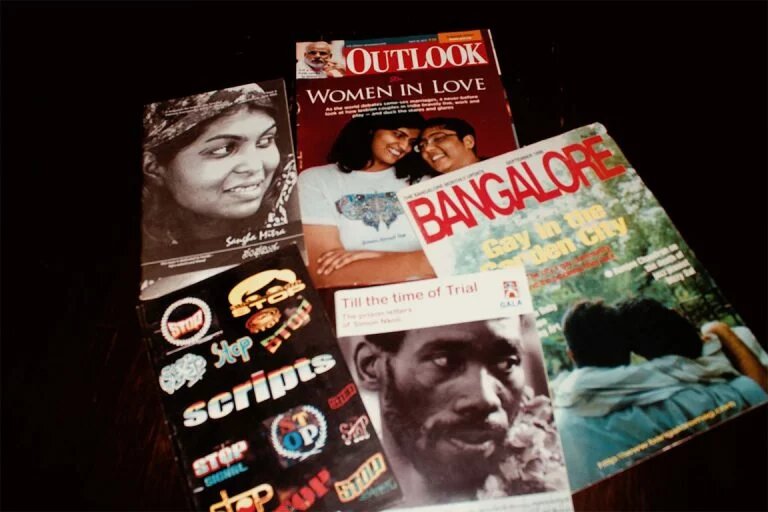
From our special on "Queering Memory".
QAMRA (Queer Archive for Memory Reflection and Activism) is a gender and sexual minorities archive in India. It is a physical multimedia archive, located in the southern city of Bangalore. It started with my collection of video footage from the year 2000, now we have over 1000 hours of video footage, still photographs, newspaper clippings in 5 languages, books, diaries and manuscripts.
India decriminalized homosexuality last year, it was a culmination of a long legal battle over 2 decades and few other landmark judgements on privacy, recognition of transgender identity etc. My journey in chronicling the queer movement is alongside the unfolding of these events.
In 1999, my friend E Manohar set up SANGAMA in Bangalore --a drop in center for working class sexuality minority community.
As more and more people identifying as hijra and kothi started coming to Sangama, the organization came under the radar of the local police.
The outreach effort also revealed that most of the community lived in a state of crisis. There were lesbian couples from out of state, mostly from neighboring Kerala and Tamil Nadu, who came seeking refuge.
There was an atmosphere of fear, yet at the same time the need to confront and fight for basic human rights became urgent. It was in this atmosphere that people like me, allies from other movements (I have been involved with labor, later gender and health issues) became a part of the sexuality movement.
One of the earliest protests in 2002 focused on what came to be known as the Chandini murder case. Chandini, a transgender woman, had been murdered by her partner and the local police had refused to register a case of murder, instead declaring that she had committed suicide. For the first time, transgender women took to the streets, and I filmed the protest. At the end of the rally, in front of the Town Hall in Bangalore, (late) activist Kajal says, “...I am a bisexual hijra and today, while we seek justice for Chandini, we also demand the repeal of section 377.”
This was a spontaneous articulation for repeal of Sec 377 of the Indian Penal code which criminalized homosexual sex in India.
The following years saw the movement to repeal 377 taking shape with civil society consultations, on the streets -as rallies, protests and pride marches, and in the court room which resulted in the landmark judgement of Delhi High court ruling on Naz vs Union of India 2009. This judgement emboldened the queer community and they started coming out and there was much celebrations, and many people started filming. But the celebration did not last - the opposition very quickly assembled and for the first time all 3 major religious institutions and individuals appealed against this ruling in the Supreme court. In 2013, The Supreme Court of India re-criminalized homosexual acts. There was outrage from everywhere- disbelief and a sense of betrayal. The following months had many vigils, protest which culminated into global day of rage across the globe. This is when the idea of archiving took concrete shape, as the SC judges refused to uphold the so called rights of a miniscule minority.
There was an urgency to put the record straight that we are here - living and breathing...
A few of us- queer activists and lawyers started looking at the video material we have so far and trying to articulate a legal language around visual jurisprudence.
Now that it is no longer criminal to be a queer, the gap between various judgements and proposed legislation is widening. There is now a move to push for a trans gender bill in the parliament which is contrary to the 2014 Supreme court ruling of NALSA which affirms personhood to trans individuals.
There is an urgency and a huge amount of work that needs to be done in order to change the hearts and minds of the people. Thus, QAMRA is imagined as an archive that goes much beyond the legal challenge to 377, and aims to document a broader canvas of queer activism in India. The purpose of this archive is also to make it a ‘living’ archive – not just to recreate nostalgia. The material in QAMRA is about the public history of the movement, but the focus is also on private lives of individuals, of which there is very little existing documentation.
We have court documents, legal notes, individual collections –letters, diaries, scribbles, Queer magazines, films and photographs...
In going about this task, we hope that this archive will serve both as a repository of collective memory and platform for collective action.
Queer rights so far have been substantially interlinked with other rights movements, as my video footage indicate, there has always been a strong interlink with other movements, so queer archive is also an archive of these other movements.
Some of the challenges therefore in archiving queer issues in India are:
- Large population and the huge rural/urban divide, linguistic diversity all make for a very heterogeneous queer community with differing access, awareness, etc. Class, with English speaking as proxy, divides queer people very much.
- QAMRA has been envisaged from the beginning to be a tool for activism as well as documentation and memory. Both archiving as an activist process as well as activism using archive as a site.
- Unique in having physical + digital. – archival policy and ethics around and for accepting material, etc. Privacy and changing gender identities pose challenge in classification of material. Need to learn a lot quickly as we go along, cataloguing & cross referencing all these material across media and language. Privacy and changing identities are a big challenge.
- Intensely aware of the power of archive to include and exclude. Working with people to design digital counterparts keeping this in mind – the process of archiving itself needs to queered and we are figuring out how to do so.
From our special on "Queering Memory".
